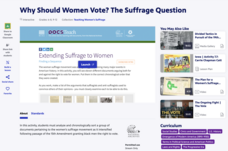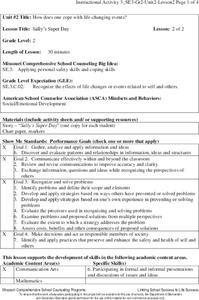Curated OER
Maniac Magee: The Cloze Procedure
Fill in the blanks with a Cloze activity based on Maniac Magee by Jerry Spinelli. After listening to a passage read out loud, kids complete the worksheet by using their memories and context clues.
Curated OER
Our Computers, Ourselves: Imagining the Digital Lives of Authors and Characters
The guiding question for this lesson is "Do computers and their contents shape who we are?" Open with a selection of Apple's commercials to introduce stereotypes and people's relationships with their computers. Then, read the attached...
Curated OER
Everyone's a Critic: Analyzing Sitcoms as Cultural Texts
Start by defining the word sitcom with the goal of launching a discussion. What exactly is a sitcom? How is a sitcom different from sketch comedy, drama, and reality television? Class members give examples, remember storylines they've...
Curated OER
Locavores
Who are les locavores? Introduce your French class to the benefits of eating local with this reading passage and the activities that accompany it. Pupils focus on developing their vocabulary, entering into a discussion with a peer, and...
Novelinks
The Little Prince: Brainstorming Activity
What do you think of when you hear the word adult? Or friend? Learners brainstorm with a group of peers to list the words they think of when they hear seven words from Antoine de Saint-Exupéry's The Little Prince.
English Worksheets Land
Compare and Contrast
Even though two passages discuss the same topic, they contain different facts and details. Scholars analyze two reading passages about the Gettysburg Address and list the ways they are the same and different.
Curated OER
Une première voiture volante
You might see a flying car before your lifetime ends! Assess your intermediate and advanced French classes with this resource, discussing the plans for a flying car. Two brief activities follow: the first develops new vocabulary, and the...
Penguin Books
An Educator’s Guide to Savvy by Ingrid Law
Literature circles give learners a chance to explore a novel in a unique way. An educator's guide for the book Savvy uses literature circles as part of the novel study. Additional activities cover elements of figurative language and...
College Board
AP® English Language: Reading and Writing Analytically
How can teachers ensure their pupils are well prepared for the AP® English exam? The reference material is a good place to start! Educators read seven essays detailing best practices for teaching scholars to read critically and write...
PBS
Why Should Women Vote? The Suffrage Question
An online interactive activity asks learners to analyze a group of documents related to the women's suffrage movement and then place the documents on a timeline. The results assess users understanding of the progression of the women's...
EngageNY
Grade 9 ELA Module 1, Unit 1, Lesson 6
Can you tell everything about a character based on their actions? Delve into the prominent characters of Karen Russell's "St. Lucy's Home for Girls Raised by Wolves" with helpful reading tips and discussion questions. A thorough lesson...
Curated OER
Lesson Plans That Boost Reading Comprehension
Reading comprehension is a cyclical process that can be supported with lesson plans that build students' knowledge and cognition.
Curated OER
At Play Long Ago and Today: comprehension skills
In this comprehension skills worksheet, students read the book At Play Long Ago and Today and complete comprehension activities. Students complete 5 activities including note taking, compare and contrast, predicting, and author's purpose.
Curated OER
Big Bushy Mustache: comprehension skills
In this comprehension skills worksheet, students read the book Big Bushy Mustache and complete comprehension activities. Students complete 5 activities including note taking, making inferences, fiction and non fiction, drawing...
Curated OER
Rain Forest Babies: comprehension skills
In this comprehension skills worksheet, 2nd graders read the book Rain Forest Babies and complete comprehension activities. Students complete 5 activities including note taking, compare and contrast, and personal opinion.
Conneticut Department of Education
Instructional Strategies That Facilitate Learning Across Content Areas
Imagine 28 instructional strategies, appropriate for all subject areas and all grade levels. Directed Reading-Thinking Activities (DRTA), Question-Answer Relationship (QAR) activities, KWL charts, comparison matrixes, classification...
Core Knowledge Foundation
The Civil War
A unit focuses on the Civil War. Second graders follow along with an informational reading about the war—why it started, how it ended, and essential individuals such as Harriet Beecher Stow, Harriet Tubman, Abraham Lincoln, Ulisses, S....
Core Knowledge Foundation
Fairy Tales and Tall Tales Tell It Again!™ Read-Aloud Anthology
Enrich a unit on fairy tales and tall tales with a set of read-aloud lessons. Second graders hone writing, vocabulary, comprehension, and literary analysis skills as they read classic stories. Complete with extension projects, discussion...
Curriculum Corner
Sports Word Work Literacy Pack
Hockey, home runs, and helmets: your next sports-themed reading unit is here! Twelve tasks invite young readers to match unscramble sports words, create categories, count vowels and consonants, mark syllables, alphabetize words in the...
Curated OER
Comprehension Activities for The Indian in the Cupboard
In this comprehension activities for The Indian in the Cupboard worksheet, students, after reading the book, answer 11 comprehension questions and complete 5 extension activities.
Curated OER
"Nasreddin and the Pot"- Reading Comprehension
In this reading comprehension worksheet, learners read a short story titled, "Nasreddin and the Pot," then answer a set of 6 multiple choice questions.
Curated OER
Soccer: Reading Comprehension
In this reading comprehension activity worksheet, learners read a 1 page selection entitled "Soccer". Students respond to 12 multiple choice questions pertaining to the passage.
Florida Center for Reading Research
Comprehension: Text Analysis, Persuade, Inform, and Entertain Sort
Why do authors write? Practice determining the author's purpose with a categorizing activity. Learners sort twelve short passages into three categories: persuade, inform, and entertain.
Missouri Department of Elementary
Sally’s Super Day
After having a bad day, Sally took scholars' suggestions and had a super day. Pupils listen to her newest short story then discuss the events that occurred. They sort each event by what was in her control and what was not. Participants...

























